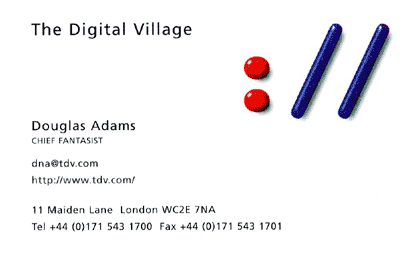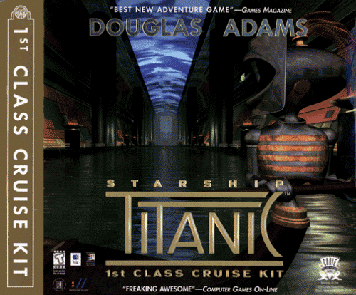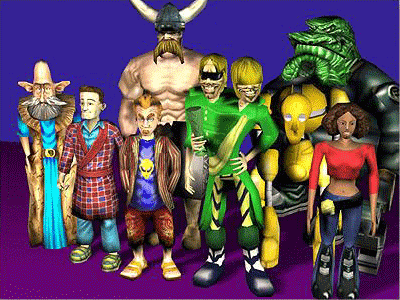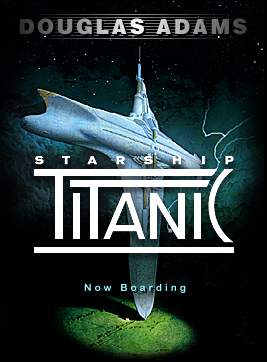DOUGLAS & COMPUTERS
Nicolas Botti : What did you think when you first met Douglas Adams?
Adam Shaikh : He was such a friendly person. He smiled, then just started chatting. It
didn't seem to occur to him that I was simply there for a job interview. I
was pretty intimidated - after all, this was Douglas Adams. But he was, and
remained, very approachable.
NB : Did you know douglas'work before you met him?
AS : Yes. I hadn't read everything he had done, but I had loved The Hitchhiker's
Guide to the Galaxy, and this is one of the things that attracted me to the
job in the first place.
NB : Have you ever played with douglas' previous infocom games : "Bureaucracy" and "the hitchhiker's guide to the galaxy"? What do you think of them?
AS : I don't remember playing Bureaucracy, but I did play The Hitchhiker's Guide
to the Galaxy. It was very, very difficult, and I seem to remember thinking
that you would be completely helpless if you hadn't read the book. However,
despite it's difficulty, some of the puzzles (for example, gettting a babel
fish) are some of the most memorable I've ever encountered.
NB : It is often said that he was an idol for the computer community and in the techies'world? Do you think it's true or exaggerated?
AS : He was a massive computer fan, and was a marvellous ambassador for geekdom.
Here was someone famous, loved, admired, with a great personality, and he
loved computers and technology. It doesn't surprise me that we geeks around
the world loved him. He also talked about computers in a way that could get
everyone interested in his topics. A scientist talking about science is
rarely interesting to people who aren't into science, but Douglas could
interest anyone in anything.
NB : Douglas loved computers and mainly Apple. He often said that he would happily spend two days programming a macro in order to save himself ten seconds when he opened a document. What kind of relation did he really have with computers?
AS : He loved them. He was as excited as anyone I've ever met when any new cool
gadget came out. He was fascinated with what technology could do, whether
it was practical or not. Being honest, Douglas didn't know nearly as much
about computers as he thought, but he did want to learn, and had an almost
insatiable appetite for all things techy.
THE DIGITAL VILLAGE

NB : Quickly after the launch of the digital village in 1995, you've been hired to be part of this adventure? How did it happen?
AS : I was approached by an agency and told that Douglas Adams' company was
looking for a designer for their new game. I was instantly interested. At
the start, I was hired for design and some implementation purposes, as the
game was originally intended to be written in a piece of software called
mTropolis. However, after a while we dropped mTropolis and I used an in
house system, writing C++.
NB : How was the team and the mood at tdv at the begining?
AS : I was one of the first two people to be employed on the game (the other
person started on the same day as me), so at the start it was quiet.
Michael Bywater and Douglas would often chat about the design, but there
wasn't a lot to get on with. As it built up, the team became a mix of
people who really were excited about doing a game with Douglas Adams, and
people who wanted to work doing CG for advertising.
NB : The company's strategy looked like quite ambitious and innovative
beetween video games, web activity (h2g2) and also projects in tv
production and educational cd roms... Did it sound like a good bet for you?
AS : It was a fascinating idea, but it was probably too grand for a company our
size. One day, I'm sure another company will get it to work, but at the
time I'd never heard of anything similar (leaving out much larger
companies).
NB : Douglas was "chief fantasist" at TDV. Was he always here with you?
AS : Not always - he was a very busy man, and would often be out. Still, he was
in most days. I think the biggest challenge was probably directing his
talent. He came up with ideas all the time, and most of the time we just
had to aim him in the right direction to focus his talents.
NB : You worked directly with Douglas. Was it hard to work with him? Robbie
Stamp said "he wanted to be the michelangelo who chips away the stone to
reveal the statue". Wow...
AS : I found it quite difficult at times - not because Douglas was hard to work
with in a negative way. Douglas was very creative, but he didn't understand
games very much. He'd churn out loads of ideas, and I'd scurry off to look
at them. In many situations, it was down to me to try to work ideas
through, and I tended to feel like the bearer of bad news if an idea
couldn't be worked into a game feature. The game evolved a lot from start
to finish - probably further than most people realised.
NB : Did you still believe in TDV even in its last days in 2000?
AS : Towards the end of TDV, I think that things had fallen apart a little bit.
The games part felt that we were supporting too many "hangers on", and the
website side felt that we were given too much freedom and power within the
company. There were also a number of other tensions, mainly caused by the
difficulties that the company was going through.
NB : Would you describe your experience at tdv as fascinating, exhausting,
frustrating, avant-garde?
AS : I loved working for TDV. I hugely admired what Robbie Stamp was trying to
do, and I worked for and with some wonderful people. The ideals that Robbie
held for running a company - treating his people with respect and kindness,
regardless of circumstance - are things that I always strive for in my newer
roles, and it's something I'll never forget. Several of us, including the
likes of Tim Browse, Sean Solle, Emma Westecott, Mike Kenny and Jack
Kriendler worked hundreds of hours overtime per month for not much short of
a year because we believed in what the company was trying to do, and we
pushed ourselves to try to make it happen. In hindsight, it probably wasn't
worth it, but we were all convinced that if we could get this right, then
the company could flourish. And that was worth a bit of pain.
STARSHIP TITANIC

NB : The design is clearly very important in "starship titanic". Did Douglas have some precise idea of what he wanted?
AS : Douglas had lots of ideas, but wasn't necessarily very focused. Like lots
of creative people, he bounced from idea to idea, and the rest of us trailed
along behind gathering them up.
NB : Starship Titanic was very late on its shedule. The game was it too complex? Which part of the game do you think was the hardest to make?
AS : The timeline for Starship Titanic was actually very interesting. Very early
on in the project there was a push from myself and the lead programmer (Tim
Browse) to switch from mTropolis to our own system. It took a long time to
get the switch done (mTropolis was eventually shown to be not up to the task
of making our game), and the time between the switch, and the time to
release was almost exactly the original schedule time.
NB : Starship Titanic, despite some very good critics, did not sell well enough to ensure TDV future. Why? Do you think it was a big part of tdv finale demise in january 2001?
AS : Personally, I always felt that Starship Titanic was helpful for the company.
It was the only project we were doing that was bringing in much money, and
so had to finance the entire company for years. Given the game was only
about half to two thirds of the employees, I thought it didn't do too badly.
NB : A novel was planned to be released at the same time than the game. They've been three versions of it. One written by classic SF author Robert Sheckley, one written by douglas'friend Michael Bywater and yet an other one by Terry Jones? Do you remember all the fuss about the book?
AS : Douglas was supposed to write the book, but just never got around to it. He
had times of the day when we weren't allowed to interrupt him so he could
work on the book, but to paraphrase a well known comment managing Douglas
was like herding cats. In the end, Terry Jones was given the job of writing
the book. He wrote it very quickly, and I'm not sure it came out exactly as
planned.
PHASE 3 STUDIOS AND THE HITHCHHIKER'S GAME

NB : You also worked on the aborted hitchhiker's game as lead designer. When the idea to make a new video game based on h2g2 came to life?
AS : The idea came about before we finished Starship Titanic. It seemed like a
logical step, and it was a project that we felt should be sellable to
publishers. Something that was important to help with company finances.
NB : This game was to be very different from "starship titanic". It was more an action game with console like, though promising, graphics? Was it more aimed at the mass market?
AS : This was definitely something that we were looking at for a mass market
project. It was important for the studio to take the next step and for us
to make a name for ourselves.
NB : The Phase 3 studios which has created the game was a merger between former tdv staff and pan interactive. Did it still look a little like tdv? The only aim of the company was to release the h2g2 game or did it have other projects?
AS : For a long time, we were still sitting in the same seats in the same office,
so it was pretty much still TDV. It was only after the website was sold to
the BBC that things split apart. The original aim was that we would become
a world class developer, and h2g2 would just be our "launch" title. The
initial backing from our publishers made us more ambitious than we would
have been otherwise. Sadly, towards the end of the project, none of the
original supporters of the project were still with our publishers, and our
publishers had been bought/ merged twice I believe. This caused a large
change in their approach to us.
NB : The game was to be published in may 2002 in the same time that "salmon of doubt". Then, a few months before the release date, the company has been shut down and the project abandoned. Why? Was it almost finished?
AS : The issues behind the cancellation were very complex, and it's not something
that I can go into. A bunch of things happened and things got very
difficult in a number of ways. Suffice to say, neither side feels happy
with the end result, and a certain amount of blame has been thrown both
ways. The project/ company/ publishers had suffered a number of problems
from start to finish, and they eventually overcame the company.
AT LAST
NB : As the movie has been green lit, a game will certainly be made. Do you
think that the phase 3 one could be reborn? If there was a new
>game based on h2g2 would you like to be part of the designer team?
AS :I'm not sure. Part of me would want to try and nurture the game - I
certainly wouldn't want to see Douglas' heritage exploited. However, I'm
not sure we'd manage to get the same quality of team that we had at the
time.
NB : What are you feelings today about douglas, and the hitchhikers?
AS : I'm still sad that I didn't get to work with Douglas more closely and
longer. He was a genuinely kind, cheery, friendly and interesting genius,
and I feel priviladged that I met and worked with him. I also feel honoured
that he trusted Tim and myself with his most prized project, as he was
always very careful about what happened with his Hitchhiker world. He
believed that we could do it justice, and this meant a lot to us.
|




